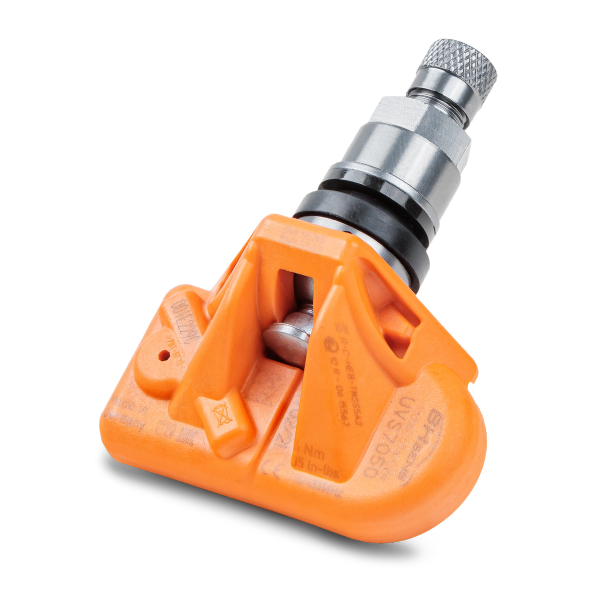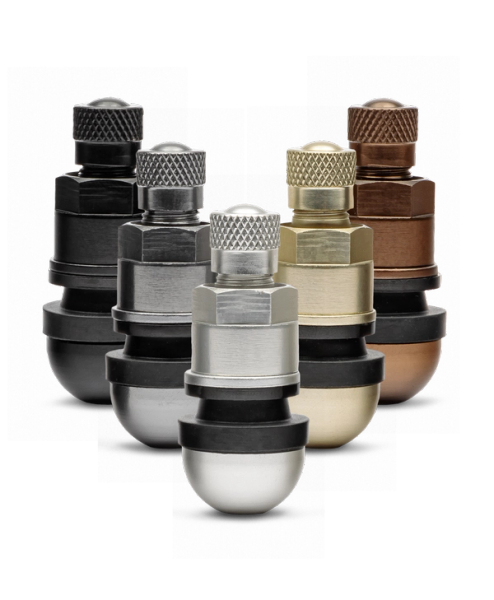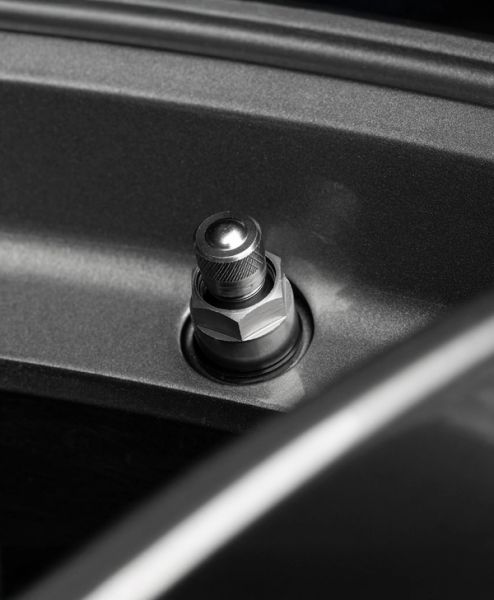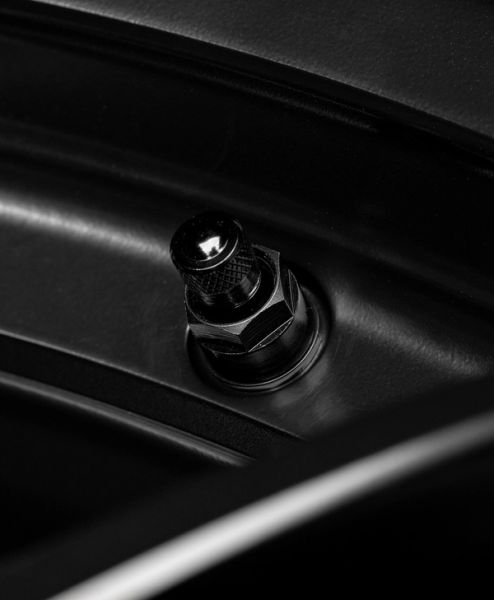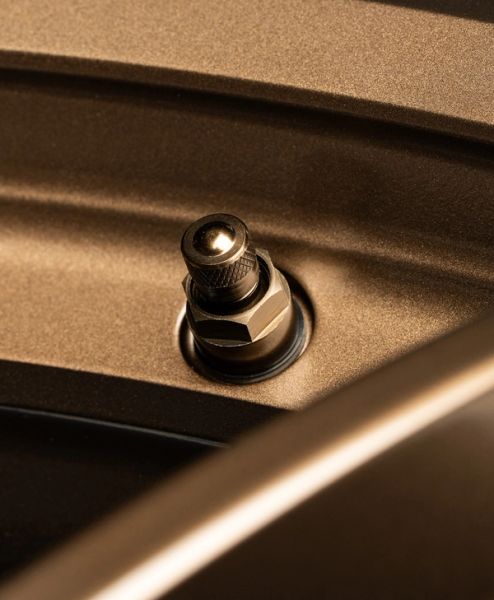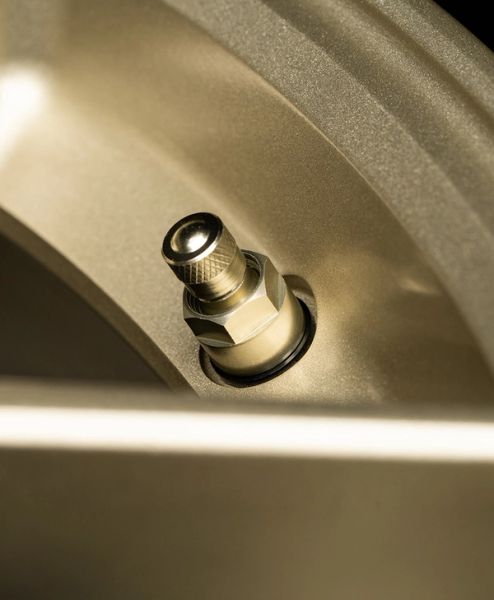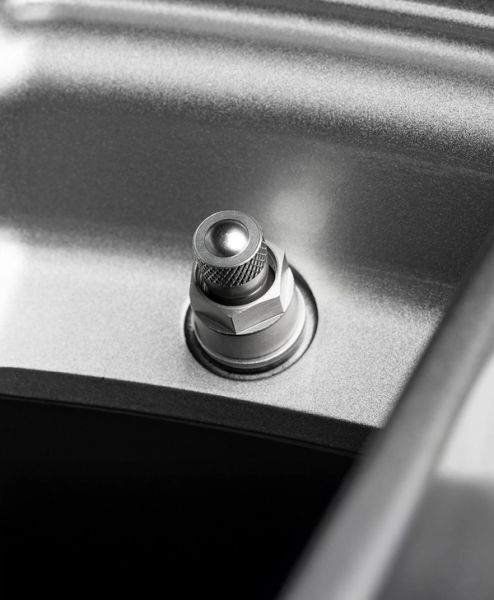Huf Camaro TPMS Sensors
Ensure a safe and seamless wheel installation with brand-new Huf TPMS sensors, paired with Apex’s premium metal valve stems.
Ensure a safe and seamless wheel installation with brand-new Huf TPMS sensors, paired with Apex’s premium metal valve stems.
Apex TPMS kits come complete with OEM-compatible TPMS sensors and full metal valve stems for superior performance. For added style and functionality, opt for our custom-designed low-profile, color-matched Apex valve stems. Not only do they enhance durability, but they also add curb appeal to your new wheels.
Huf metal valve stems are also available, but are not color-matched.
- TPMS sensors sold individually
- Includes either an Apex Low-Profile or Huf metal valve stem available in multiple colors to best match your wheels
- 1-year manufacturer's warranty
Color Matching
Check out the images below to see how well Apex's valve stems match Apex wheel finishes.
Note: Huf valve stems are not color matched.
Apex Anthracite Stem / Apex Anthracite Wheel

Apex Black Stem / Apex Satin Black Wheel

Apex Bronze Stem / Apex Satin Bronze Wheel

Apex Motorsport Gold Stem / Apex Motorsport Gold Wheel

Apex Silver Stem / Apex Race Silver Wheel

Color Recommendations
The table below lists the valve stem colors our team would recommend for each of our wheel finishes offered.
| Wheel Finish | Recommended Valve Color |
|---|---|
| Anthracite | Anthracite/Gunmetal |
| Brushed Clear | Silver |
| Hyper Black | Anthracite/Gunmetal |
| Machined Lip Anthracite | Silver |
| Machined Lip Brushed Clear | Silver |
| Machined Lip Gloss Motorsport Gold | Silver |
| Machined Lip Race Silver | Silver |
| Motorsport Gold | Motorsport Gold |
| Race Silver | Silver |
| Satin Black | Black |
| Satin Bronze | Bronze |
Apex vs. Huf Comparison
The image below shows the differences between our new Low-Profile valve stems and the Huf metal valve stems. More images can be viewed in the gallery above.
Huf valve stems are pictured on the left. Apex valve stems are pictured on the right.

The New Generation of Sensors from Huf IntelliSens
Huf is the OE supplier of direct measuring tire pressure monitoring systems (TPMS) to car manufacturers across Europe, USA, and Asia. Huf has also developed the universal sensor "IntelliSens" for the independent aftermarket which carries the same OE quality.
IntelliSens is fitted directly to the valve and measures the tire pressure and temperature from the inside of every tire. This data is then displayed on the dashboard by a control unit. This method of measurement is not only faster, but also more accurate than indirect methods that use ABS/ESP sensors. Whether you are purchasing a new set of wheels and tires, or simply replacing old faulty sensors, Apex has you covered.
The Benefits for Drivers
Added Safety and Performance A study by the National Highway Traffic Safety Association (NHTSA, USA) showed that vehicles with a tire pressure at the recommended level are much more likely to be involved in an accident due to tire damage. Detecting and eliminating tire pressure problems early on improves drivability and prevents accidents caused by tire damage or failure.
As driving enthusiasts, we all want to extract the most performance out of our vehicles. By running optimum tire pressures, tire performance and longevity will be maximized. Properly working TPMS sensors ensure drivers are informed with accurate readings so adjustments can be made if necessary.
Reduces the Cost of Driving The TPMS helps to extend the lifespan of a tire. A tire with 20% less pressure than the recommended level shortens the lifetime of the tire tread by up to 25%. Switching to a direct measurement TPMS offers financial benefits through the extended service life.
Greener Roads and Improved MPG Driving with the correct air pressure can lower fuel costs by 1-3%. By reducing the fuel consumption and extending the lifetime of the tires, IntelliSens contributes to the reduction of CO2 emissions.
Frequently Asked Questions
Do I need TPMS sensors?
Tire pressure monitoring systems (TPMS) are standard equipment on almost all vehicles as of around 2006. For vehicles that were not equipped with TPMS, no sensors are required.
Why replace sensors when installing new wheels?
Sensor Age - TPMS sensors use non-serviceable batteries that typically last about 5-7 years. While they can often last upwards of 10 years, any sensor this old is on borrowed time and we recommend replacement.
Labor Costs - Because of the time and cost associated with removing the tires to replace these sensors, we recommend installing new sensors at the same time as a new set of wheels since the tires will already be removed. The cost to dismount and re-mount 4 tires can often exceed that of simply replacing the sensors proactively.
Convenience - If you’re buying a second set of wheels dedicated to either track or winter/snow use, you’ll save time and money by installing new sensors, rather than having to swap sensors between wheels.
Are TPMS sensors required for track/race use?
Track enthusiasts and racers alike are notoriously hands-on, measuring tire temperatures and pressures consistently throughout an event to ensure they are getting the most performance and longevity out of their tires. For this reason, many choose not to install TPMS sensors on a dedicated set of track/race wheels and tires. By doing so, a warning light will be triggered on vehicles equipped with TPMS sensors from the factory and driving modes may be limited on newer vehicle models produced after 2013. To avoid these limitations, many drivers turn to aftermarket programming/coding options to disable the TPMS entirely, which can be done at their own risk.
Questions? We’ve got Experts
If you have any questions or would like to confirm your selection prior to ordering, please feel free to contact our Product Specialists by using our contact form or by calling (925) 245-0773. Apex is not responsible for any associated costs with tire mounting, balancing or dismounting.
Note: Sensors are preprogrammed to work with your vehicle, however, you will need to initialize (synchronize) them to your vehicle per the process outlined in your owner's manual.
